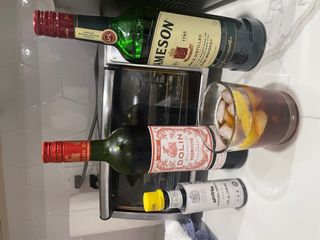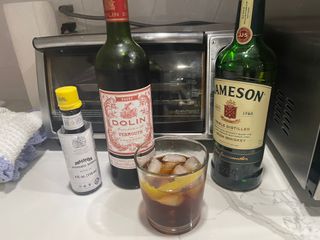Cocktail recipes with Irish whisky and Sweet vermouth
About the ingredients
- Irish whisky: Irish whisky (Irish: Fuisce or uisce beatha) is whisky made on the island of Ireland. The word 'whisky' (or whisky) comes from the Irish uisce beatha, meaning water of life. Irish whisky was once the most popular spirit in the world, though a long period of decline from the late 19th century onwards greatly damaged the industry, so much so that although Ireland boasted at least 28 distilleries in the 1890s, by 1966 this number had fallen to just two, and by 1972 the remaining distilleries, Bushmills Distillery and Old Midleton Distillery (replaced by New Midleton Distillery), were owned by just one company, Irish Distillers. The monopoly situation was ended by an academically-conceived launch of the first new distillery in decades, Cooley Distillery, in 1987.[5] Since the 1990s, Irish whisky has seen a resurgence in popularity and has been the fastest-growing spirit in the world every year since 1990. With exports growing by over 15% per annum, existing distilleries have been expanded and a number of new distilleries constructed. As of December 2019, Ireland has 32 distilleries in operation, with more either planned or under development.
- Vermouth: Vermouth is an aromatized fortified wine, flavoured with various botanicals (roots, barks, flowers, seeds, herbs, and spices) and sometimes colored. The modern versions of the beverage were first produced in the mid to late 18th century in Turin, Italy. While vermouth was traditionally used for medicinal purposes, it was later served as an apéritif, with fashionable cafés in Turin serving it to guests around the clock. In the late 19th century, it became popular with bartenders as a key ingredient for cocktails, such as the martini, the Manhattan, the Rob Roy, and the Negroni. In addition to being consumed as an apéritif or cocktail ingredient, vermouth is sometimes used as an alternative to white wine in cooking. Historically, there have been two main types of vermouth: sweet and dry. Responding to demand and competition, vermouth manufacturers have created additional styles, including extra-dry white, sweet white (blanc or bianco), red (rosso), amber (ambre), and rosé. Vermouth is produced by starting with a base of neutral grape wine or unfermented wine must. Each manufacturer adds additional alcohol and a proprietary mixture of dry ingredients, consisting of aromatic herbs, roots, and barks, to the base wine, base wine plus spirit, or spirit only – which may be redistilled before adding to the wine or unfermented wine must. After the wine is aromatized and fortified, the vermouth is sweetened with either cane sugar or caramelized sugar, depending on the style. Italian and French companies produce most of the vermouth consumed throughout the world.
Latest executions
-
Blackthorn by @inerte at
Specific liquor brands used
Extra volume: 100%I am listening to Shogun and thought it would be a good idea to drink this. It's an ok drink! Easy to make and tastes strong.

